How To Get Business Loan: Guide to the Best Business Loans in the Philippines for Startups & SMEs

Are you a startup aspiring to be the next Philippine unicorn or a small business looking to expand?
For any business, cash is oftentimes your lifeline. It sustains your daily business activities and fuels your future growth. In the Philippines, less than 20% of MSMEs have access to formal lending companies, making it a challenge for many businesses to stay afloat when cash is hard to come by.
In this article, you will learn to properly assess whether or not you need a business loan, which one could be best for you, and how to get a business loan.
Related: An Ultimate Guide to the Best Business Ideas in the Philippines
Table of Contents
- At a Glance: Best Business Loans for Startups and SMEs in the Philippines
- What Is the Difference Between a Business Loan and a Consumer Loan?
- What Are the Types of Business Loans?
- How To Get a Business Loan: 5 Steps
- Step 1: Find out exactly what you need
- Step 2: Choose a lender and a business loan that will fit your needs
-
Best Bank Options – Term Loans
- 1. BDO SME Term Loan (Secured)
- 2. DBP Response – MSME Recovery (Retail Lending) Term Loan (Unsecured & Secured Options)
- 3. Citibank Personal Loan (Unsecured)
- 4. PSBank SME Term Loan With Prime Rebate (Secured)
- 5. CTBC SME Business Loan (Secured) Term Loan
- 6. UCPB Small Business Loan (SBL) Secured Term Loan
- 7. Bank of Commerce Term Loan (Secured)
- 8. BPI SME Term Loan (Secured)
- Best Bank Options – Credit Line Loans
- Best Private Lender Options – Term Loans & Credit Loans
-
Best Bank Options – Term Loans
- Step 3: Prepare the necessary requirements
- Step 4: Apply for your business loan
- Step 5: Receive your business loan
- Tips & Warnings
- Frequently Asked Questions
- References
At a Glance: Best Business Loans for Startups and SMEs in the Philippines
| Business Loan | Type of Loan |
| BDO SME Loan | Term Loan (Secured) |
| DBP Response – MSME Recovery (Retail Lending) Loan | Term Loan (Unsecured and Secured) |
| Citibank Personal Loan | Term Loan (Unsecured) |
| PSBank SME Loan With Prime Rebate | Term Loan (Secured) |
| CTBC SME Business Loan | Term Loan (Secured) |
| UCPB Small Business Loan (SBL) | Term Loan (Secured) |
| Bank of Commerce | Term Loan (Secured) |
| BPI SME Loan | Term Loan (Secured) |
| CTBC SME Business Loan Revolving | Credit Line Loan (Secured) |
| BDO SME Ready Check | Credit Line Loan (Secured) |
| UCPB Small Business Loan (SBL) Promissory Note Line | Credit Line Loan (Secured) |
| Bank of Commerce (BCL) | Credit Line Loan (Secured) |
| BPI SME Loan | Credit Line Loan (Secured) |
| Radiowealth Finance Co. Business Loan | Term Loan (Secured and Unsecured) |
| Esquire Non-Collateral Business Loan | Term Loan (Unsecured) |
| First Circle Revolving Loan | Credit Line Loan (Unsecured) |
| Vidalia Small Business Loan | Term Loan (Unsecured) |
What Is the Difference Between a Business Loan and a Consumer Loan?
Before discussing your options, let’s first figure out what a business loan is and how it differs from other kinds of loans. Loans can be classified as either a consumer loan or a business loan.
1. Consumer Loan
A consumer loan is a kind of loan in which you incur personal debt to pay for goods or services. They can be used to buy big-ticket items, pay for emergency expenses such as hospital bills, pay for house repairs or renovations, and more. Some private lenders, such as Radiowealth Finance Company Inc., offer specific loans that can even finance the purchase of appliances and gadgets.
Some of the common types of consumer loans in the Philippines include:
- Auto loans – used for the purchase of vehicles
- Housing loans – used to buy a condo, a house and lot, or a vacant lot, or to pay for the construction or renovation of a home
- Student loans – this loan can be used by qualifying students to pay for tuition and other school-related expenditures
- Personal loans – a multi-purpose loan that can be used for your daily needs. These include payments for your regular utility bills, groceries, medicines, and more.
2. Business Loan
As the name implies, a business loan is a form of loan that is specifically used to fund business activities. Private lenders, such as Radiowealth Finance Company Inc., and banks offer various packages that can be used to pay for your daily operational expenses, purchase equipment, and pay bills, as well as cover other expenses of your business.
To better understand what kind of business loan is best for you, let’s look at the different types of business loans. Business loans can be divided into 2 categories: a) based on the method of disbursement of funds to you and how you pay back your loan and b) based on the requirement of collateral.
What Are the Types of Business Loans?
1. Based on How You Get the Funds & Pay It Back: Term Loans & Credit Line Loans
a. Term Loans
Loans that are disbursed in a lump sum and repaid over a specific period are called term loans. These loans have a fixed interest rate for the duration of the loan, which is why they are also called fixed-rate loans.
They are ideal for many businesses because it makes it easier to plan for the repayment of the loan. You’ll know how much you’ll have to pay back and when you’ll have to pay it. This will allow you to set aside the remainder of your money for your business operations.
b. Credit Line Loan
A credit line loan, on the other hand, is more like a credit card. Instead of getting a lump sum, you are extended a line of credit. You have access to draw upon this line of credit at any time for the duration of your loan period, as long as you don’t exceed the maximum amount in your loan agreement. It gives you the flexibility to get only what you need and pay only for what you use.
2. Based on the Requirement of a Collateral: Secured & Unsecured Business Loans
In order to protect their capital, lenders may ask for collateral, an asset that can be used to cover the payment of your loan in case you are unable to pay it back.
a. Secured Loans
Secured Loans are loans that require collateral. These types of loans can be riskier for you because your asset can be seized if you’re unable to pay off your loan. Additionally, despite being required to provide collateral, you will still be paying for the interest on your loan based on your creditworthiness.
b. Unsecured Loans
Unsecured loans do not require collateral. They can be a less risky option for you compared to secured loans but it is often at the expense of higher loan interest rates. The application process is also fairly simpler because there is no need to have any collateral to be appraised by the lender.
Before a lender agrees to give you a loan, they will first assess your capability to pay it back. They will do this by looking at your credit history, current streams of income, and the viability of your business.
Note that loans can be a combination of the two categories. For example, a loan can be both a term loan and a secured loan, meaning it’s a loan that disburses a lump sum amount and that requires collateral.
How To Get a Business Loan: 5 Steps
Step 1: Find out exactly what you need

You should do a bit of self-analysis so that you can figure out what kind of business loan you’ll need. One of the best ways to do this is by asking yourself the following questions:
- What will I use the business loan for?
- How urgent is the need for funds?
- Are there other sources of financing available to me?
In general, term loans are best used in scenarios where you need a lot of time to pay for your loan and when you need a large amount of money upfront to fund a specific business need. Some of these scenarios may include:
- Purchase of property/real estate
- Facility improvements and repairs
- Purchase of vehicles such as trucks
- Purchase of equipment and machinery
Meanwhile, credit line loans are often a good choice when you need a readily available source of cash to fund repeated business expenses during slower seasons or if you have outstanding accounts receivable from your customers. If you’re an SME, credit line loans are an excellent choice to better smoothen out your cash flow and to bridge your working capital needs. Some example scenarios where credit loans would be ideal include:
- Purchase of additional inventory during a sudden surge of demand
- Pay for your employees’ wages during off-peak seasons
- Take advantage of unanticipated business opportunities
However, these are only general rules. At the end of the day, you should only choose a loan that meets your current situation. Consider these two scenarios:
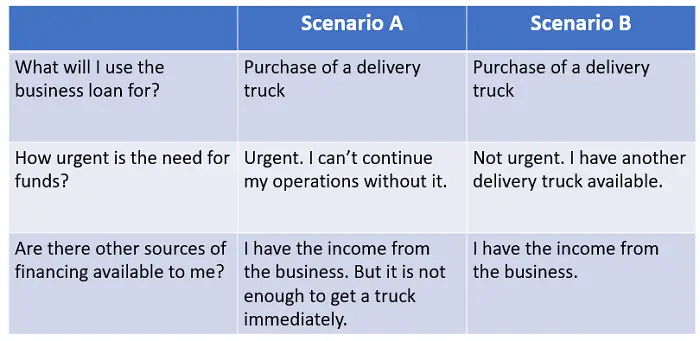
In both scenarios A and B, you need to purchase a delivery truck. However, scenario A is much more urgent since they can’t continue their business operations without it. That’s why a term loan, where you can immediately get a lump sum of money, is a better fit for your needs.
Meanwhile, in scenario B, the situation is not urgent. And since they have the income from the business, you can choose a credit line loan and be confident that you can pay the loan’s recurring dues.
Step 2: Choose a lender and a business loan that will fit your needs
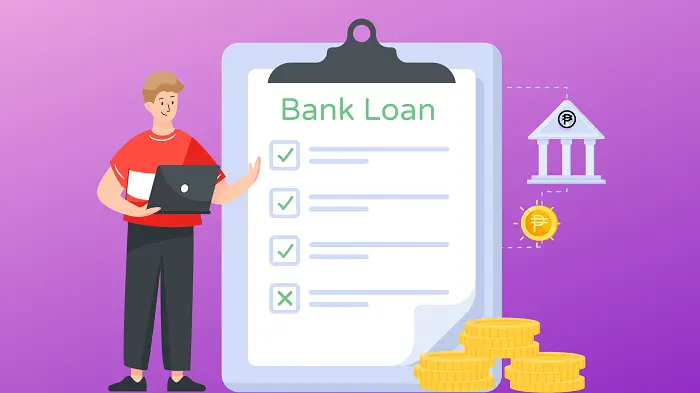
There are several banks and private lenders in the Philippines that offer a wide range of business loan options, including term and credit line loans.
Typically, bank loans have lower interest rates, higher loan limits, and have no hidden charges. If you are diligent with paying your fees on time, you can build a good credit history with your bank which can help you secure better deals with them in the future.
Some banks can offer you loan discounts if you pay ahead or in excess of your regular dues. On the flip side, banks will often ask for more documentation and will have more stringent requirements for loan processing.
Private lenders typically require less documentation than banks. Many of them also have lower minimum loan requirements. They are often a faster and simpler way to get a loan. On the other hand, private lenders tend to charge higher interest rates which may present a challenge to you and your business.
Best Bank Options – Term Loans
1. BDO SME Term Loan (Secured)
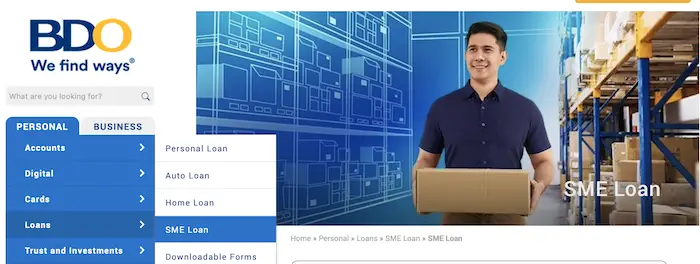
a. Best For: SMEs that are looking for aggressive expansion and need a large lump sum amount to pay for big-ticket items.
b. Where/When To Use:
- Purchase of new assets such as machines and equipment
- Acquisition of real estate properties
- Construction, repair, and renovation of business facilities
c. Loan Amount: PHP 1,000,000.00 to PHP 20,000,000.00
d. Loan Term: Choose a loan term of up to 10 years.
e. Rates: Use their calculator here
f. How To Apply: You can apply for their loan through their website. It provides a step-by-step guide on how to apply for their loan, as well as a detailed list of their requirements.
g. Accepted Collateral: House and lot, commercial property, vacant lot, condominium, townhouse, mixed-use property (residential/commercial)
2. DBP Response – MSME Recovery (Retail Lending) Term Loan (Unsecured & Secured Options)
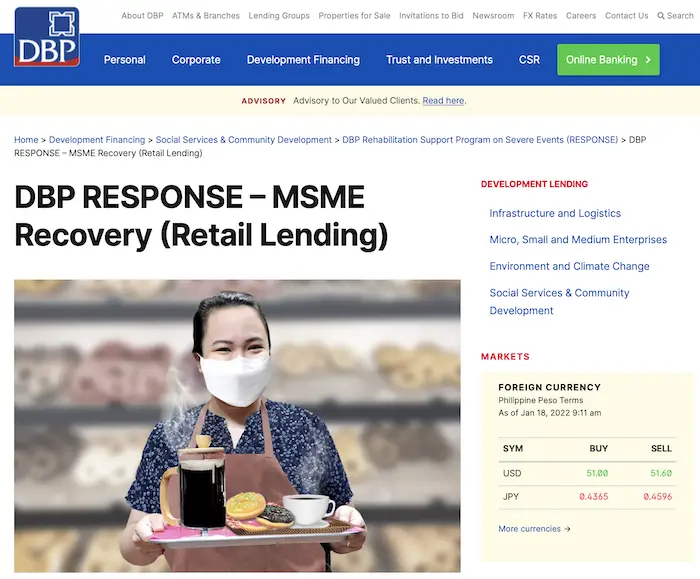
a. Best For: COVID recovery package.
b. Where/When To Use: For working capital requirements (short-term or permanent) to finance the operating expense of the business to ensure continued operations.
c. Loan Amount: Up to 100% of the one (1) year cash operating expense based on 2019 audited and/or BIR stamped financial statements or the annualized 2020 interim financial statement, whichever is higher.
d. Loan Term: Maximum of three (3) years including a grace period.
e. Rates: 3% per annum fixed for three (3) years.
3. Citibank Personal Loan (Unsecured)

a. Best For: Flexibility and speed. You can get your loan approved in as fast as 24 hours. Provides the greatest flexibility among available bank business loans. You can use this loan to fund business and personal expenses.
b. Where/When To Use: For quick funding requirements while having flexible repayment terms.
c. Loan Amount: PHP 100,000 to PHP 2,000,000.
d. Loan Term: 1 to 5 years.
e. Rates: 26.9% Annual Contractual Rate.
4. PSBank SME Term Loan With Prime Rebate (Secured)
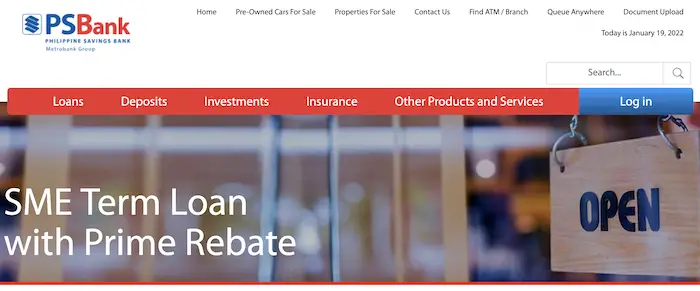
a. Best For: Loan discount and rebate opportunities. Their Prime Rebate allows you to get a loan interest discount whenever you make advance or excess payments on your monthly due, making your money work for you.
b. Where/When To Use: For fixed asset acquisition, construction or to boost your permanent working capital. This is an ideal option when you want to cover your organization’s long-term financing needs while preserving your own funds.
c. Loan Amount: Minimum of PHP 2 million if the collateral is real estate property, PHP 500,000 if against deposits (meaning they can use the money in your PSBank account as collateral).
d. Loan Term: Minimum of 1 year and a maximum of 7 years from the date of initial availment.
e. Rates: Based on the prevailing lending rate of the bank at the time of loan availment.
f. Accepted Collateral: Any prime residential/commercial/industrial property with or without building improvements; cash deposits.
5. CTBC SME Business Loan (Secured) Term Loan
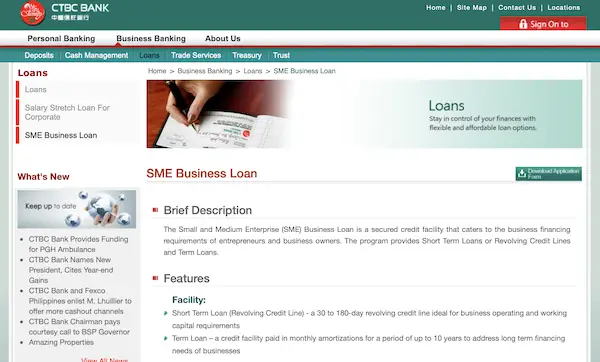
a. Best For: Long-term financing needs and refunding of your other existing loans.
b. Where/When To Use:
- Business expansion
- Acquisition
- Working capital
- Refinancing of existing credit facilities
c. Loan Amount: PHP 500,000 to PHP 70,000,000.
d. Loan Term: Up to 10 years.
e. Rates: Prevailing SME business loan rate at the time of availment.
f. Accepted Collateral: Real estate properties.
6. UCPB Small Business Loan (SBL) Secured Term Loan
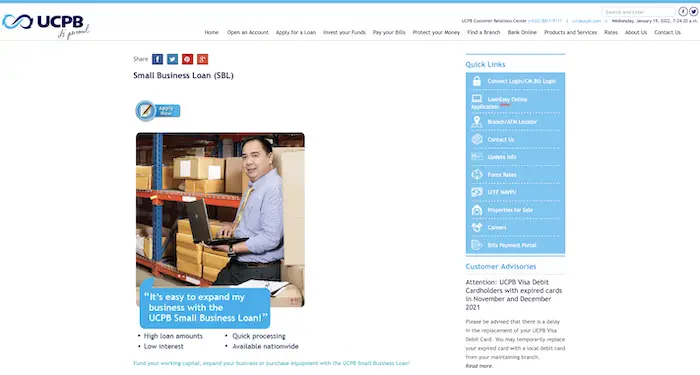
This business loan boasts high loan amounts, quick processing, low-interest rates, and nationwide availability.
a. Where/When To Use:
- Construction of warehouse
- Office expansion
b. Loan Amount: PHP 500,000 – PHP 15,000,000
c. Loan Term: Minimum of 1 year, maximum of 7 years.
d. Rates: Based on the prevailing lending rate of the bank at the time of loan availment.
e. Accepted Collateral: Residential, commercial & industrial properties.
7. Bank of Commerce Term Loan (Secured)
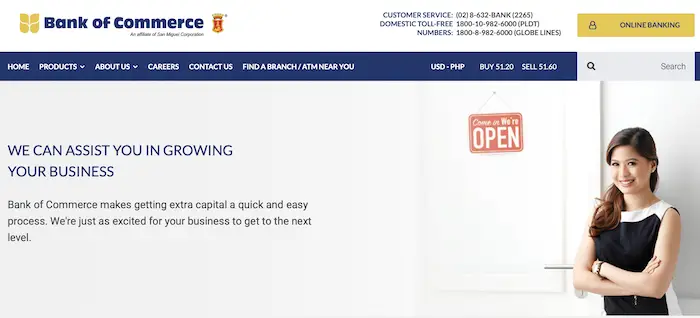
a. Where/When To Use:
- For fixed asset acquisition, business expansion
- Additional working capital
b. Loan Amount: PHP 1,00,000 – PHP 15,000,000
c. Loan Term: Minimum of 1 year, maximum of 5 years.
d. Rates: Prevailing lending rate.
e. Accepted Collateral: Any prime residential/commercial/industrial property with or without improvements and/or cash deposits under the name of the applicant.
8. BPI SME Term Loan (Secured)
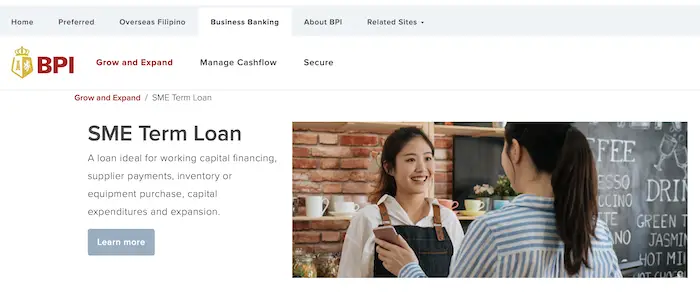
a. Where/When To Use: Ideal for working capital financing, supplier payments, inventory or equipment purchase, capital expenditures, and expansion.
b. Loan Amount: Minimum of PHP 300,000.
c. Loan Term: Maximum of 5 years.
d. Rates: Prevailing lending rate.
e. Accepted Collateral: Real estate mortgage, deposit, or investment.
Best Bank Options – Credit Line Loans
1. CTBC SME Business Loan Revolving Credit Line Loan (Secured)
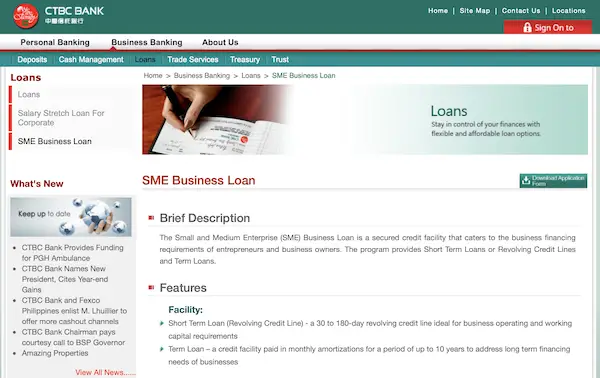
a. Best For: Larger-scale operations that need access to bigger amounts of working capital on demand. 30 to 180-day revolving credit line loan ideal for business operating and working capital requirements
b. Where/When To Use:
- Business expansion
- Acquisition
- Working capital
- Refinancing of existing credit facilities
c. Loan Amount: PHP 500,000 to PHP 70,000,000.
d. Loan Term: 30, 60, 90, or 180 days.
e. Rates: Prevailing SME business loan rate at the time of availment.
f. Accepted Collateral: Real estate properties.
2. BDO SME Ready Check (Secured)
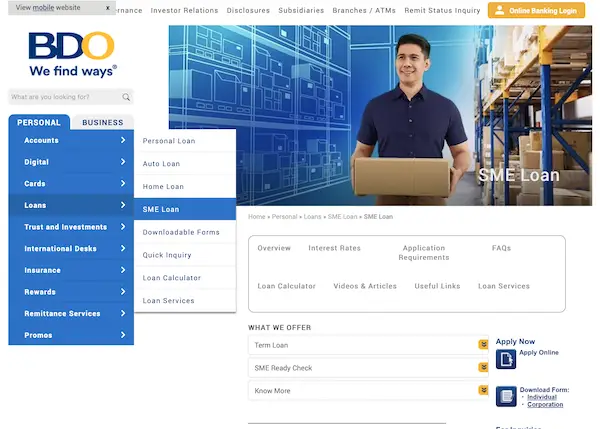
a. Best For: SMEs that are looking for aggressive expansion. This loan option is excellent for bigger operations where you need to have quick access to larger amounts of cash to augment your working capital.
b. Where To Use:
- Buying inventory or supplies to address seasonal or bulk orders.
- Working capital to address operational requirements.
- Paying supplier while waiting for customer collection.
c. Loan Amount: PHP 1,000,000.00 to PHP 20,000,000.00
d. Loan Term: Choose a loan term of up to 10 years.
e. Rates: Use their calculator here.
f. How To Apply: You can apply for their loan through their website. It provides a step-by-step guide on how to apply for their loan, as well as a detailed list of their requirements.
3. UCPB Small Business Loan (SBL) Promissory Note Line (Secured)
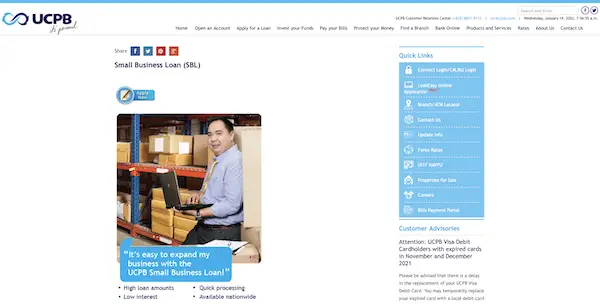
a. Best For: Distributors, franchisees, and manufacturing companies that need to manage their inventory.
b. Where/When To Use:
- Inventory build-up
- Office expansion
c. Loan Amount: PHP 500,000 – PHP 15,000,000
d. Loan Term: One-year revolving line.
e. Rates: Based on the prevailing lending rates.
f. Accepted Collateral: Residential, commercial & industrial properties.
4. Bank of Commerce BCL (Secured)
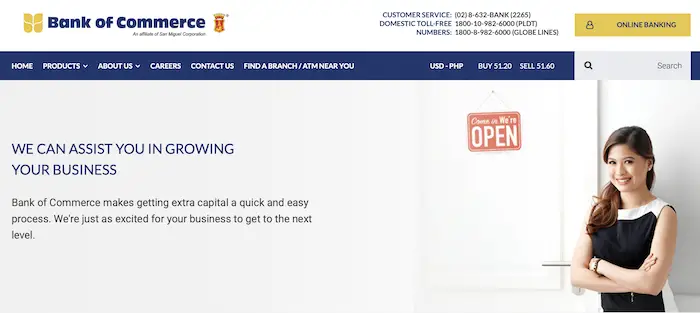
a. Where/When To Use:
- For fixed asset acquisition, business expansion
- Additional working capital
b. Loan Amount: PHP 1,00,000 – PHP 15,000,000
c. Loan Term: Up to line expiry (credit line is valid for one year subject to annual review).
d. Rates: Prevailing lending rate.
e. Accepted Collateral: Any prime residential/commercial/industrial property with or without improvements and/or cash deposits under the name of the applicant.
5. BPI SME Credit Line (Secured)
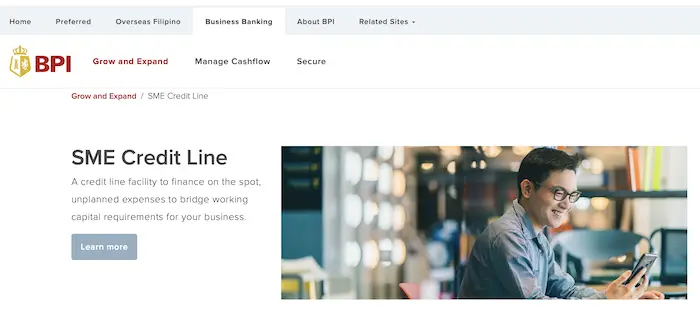
a. Where/When To Use: A credit line facility to finance on the spot, unplanned expenses to bridge working capital requirements for your business.
b. Loan Amount: Minimum of PHP 300,000.
c. Loan Term: 1 year renewable.
d. Rates: Prevailing lending rate.
e. Accepted Collateral: Real estate mortgage, deposit, or investment.
Best Private Lender Options – Term Loans & Credit Loans
1. Radiowealth Finance Co. Business Loan (Term Loan) – Secured and Unsecured Options Available
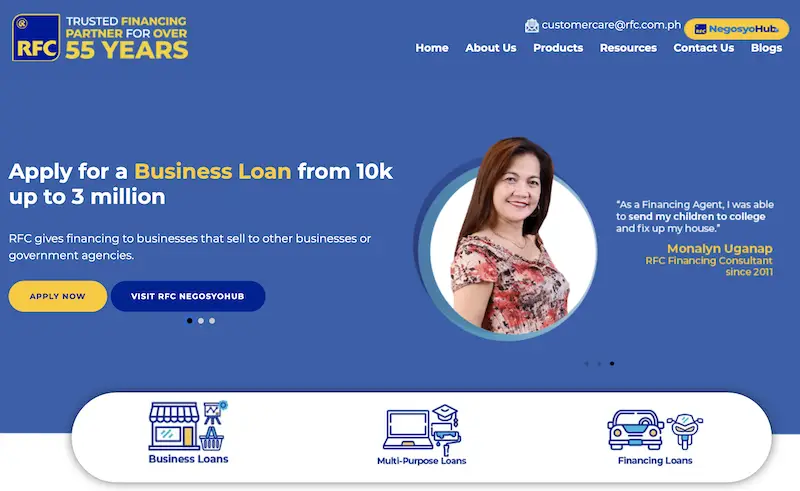
a. Best For: Specific equipment purchases ranging from appliances to trucks and farm equipment. Offers a great deal of flexibility because of their low loan limit of PHP 10,000.
b. Where/When To Use:
RFC provides a wide range of business loan options that can address very specific business requirements. Some of their packages include:
- Truck Loan – Buy the truck and heavy equipment you need for your business operations.
- Farm Equipment Loan – Buy, upgrade, or replace the equipment to improve and grow your farm operations.
- Application Loan – Get the appliances for your home or business. From cooking appliances to air conditioners, RFC can help you buy the appliances you need.
- Machinery and Equipment Loan – From heavy-duty equipment to other machinery such as generators, RFC can help finance the equipment you need.
- Working Capital Loan – From covering business expenses to generating more revenue, RFC can help you finance your business with a Working Capital Loan.
- SME Micro Loan – Bounce bank and expand your business with SME Micro Loan.
c. Loan Amount: PHP 10,000 to PHP 3,000,000.
d. Loan Term: 3 to 18 months.
e. Rates: 3.7% p.m.
f. Accepted Collateral: RFC specifies collateral requirements for secured loans. The collateral will be assessed by RFC experts & should be insured by the borrower.
2. Esquire Non-Collateral Business Loan (Unsecured)
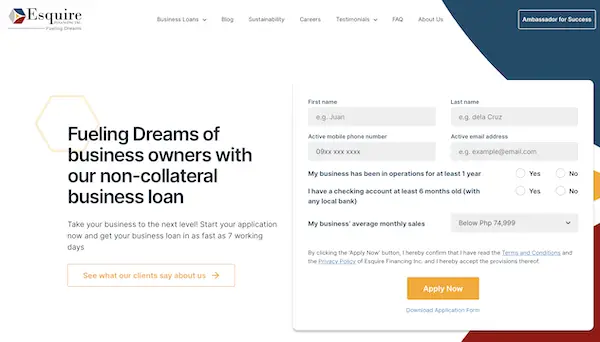
a. Best For: Getting high loan amounts without a need to provide collateral.
b. Where/When To Use: For business expansion or as additional working capital.
c. Loan Amount: PHP 100,000 to PHP 10,000,000.
d. Loan Term: Minimum of 90 days, maximum of 360 days.
e. Rates: From 3.5% per month.
3. First Circle Revolving Credit Line (Unsecured)
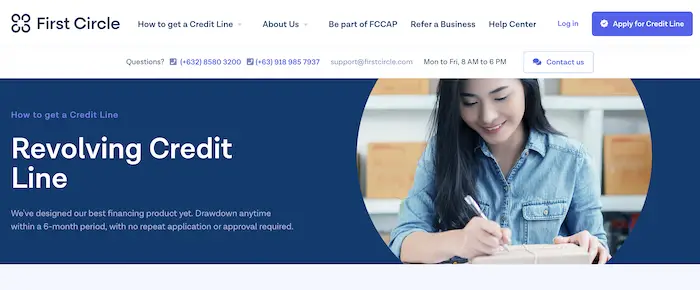
a. Best For: Business owners who receive purchase orders and issue invoices. Once your loan has been approved, they can transfer the money to your account in as fast as 5 days.
b. Where/When To Use:
- Buying additional inventory during peak seasons.
- Extending credit to customers.
c. Loan Amount: From PHP 250,000 to PHP 10,000,000.
d. Loan Term: Up to 1 year renewable
e. Rates: As low as 1.39% per month. First Circle also has the best price guarantee offer — if any SME has a better offer on non-collateral financing from another legitimate lender, they are willing to beat the price by 10%.
4. Vidalia Small Business Loan Term Loan (Unsecured)
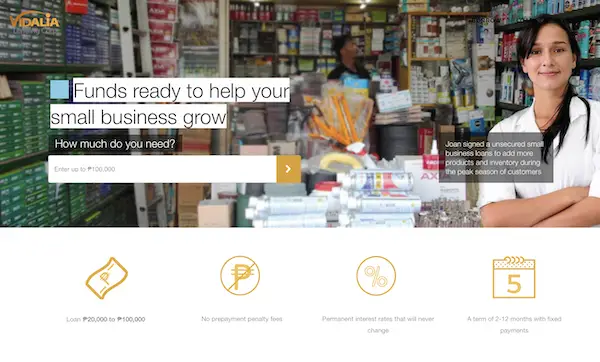
a. Best For: Entrepreneurs looking for a flexible repayment schedule. They give you the flexibility to decide when to repay your loan. Choose from daily, weekly, and bi-monthly options.
b. Where/When To Use:
- Quick funding solution to pay for relatively small business expenses.
- Fix unexpected cash flow problems.
c. Loan Amount: PHP 10,000 – PHP 100,000.
d. Loan Term: 2 to 12 months.
e. Rates: 5% per month.
Not enough funds to start your franchise business? Read this: How To Get a Loan for Your Franchise Business
Step 3: Prepare the necessary requirements

Different banks and private lenders may have different requirements for loan processing, depending on their available package. It’s important to talk to your lender to get a full list of requirements for the specific loan package that you want.
The following is a list of some of the most common requirements:
1. Common bank requirements
a. For loan eligibility
- Age Requirement: 21 – 70 yrs old at the end of the loan term
- You are a Filipino resident or a local resident foreigner with a valid Philippine billing address
- Track record of 2-3 years profitable business. For start-up companies, some lenders only require 1 year in operation
- You have a Taxpayer’s Identification Number (TIN)
- Willingness to offer collateral to secure your loan (applicable to secured loans)
- No history of mishandled accounts, delinquent credit cards, or past due loans
- Minimum gross annual income of PHP 250,000
- Well-defined source of repayment
b. Documentary requirements
- Duly filled-out and signed application form
- Two (2) valid IDs
- Business registration papers: DTI Certificate of Registration; SEC Articles of Incorporation and By-Laws, General Information Sheet; Company profile and ownership structure; Income Tax Returns with Audited Financial Statements for the last 2 to 3 years duly stamped “received” by the BIR; and Business/Mayor’s Permit
- Audited Financial Statements for the last three (3) years
- Photocopies of TCT/CCT and Tax Declaration of the collateral property
- Photocopy of lot plan/vicinity plan/subdivision plan
2. Common private lender requirements
a. For loan eligibility
- Filipino citizen not younger than eighteen (18) years of age
- Residency of at least two (2) years, except if you are a new homeowner
- Must be registered with 1) BIR and 2) DTI or SEC
- 1+ year/s in operation
- Minimum Net Monthly Income of PHP 20,000.00
b. Documentary requirements
- For registered businesses: DTI or SEC Certificate; BIR Certificate of Registration Form 2303; and Copy of Permission Barangay Business
- 2 valid government ID’s (if employed, pls include company ID)
- Proof of Income (3-month payslip)
- Certificate of Employment
- Proof of Billing (electricity, water, landline)
3. Collaterals and special requirements (for secured loans)
For secured loans, the lender will likely ask you to provide additional requirements such as a photocopy of the title, a lot plan with vicinity map, a tax declaration, and Special Power of Attorney (SPA), if necessary. Some lenders will also ask for more documentary requirements than others. It would be best to talk directly to your lender to ask for their specific requirements.
Step 4: Apply for your business loan

With all the necessary documents ready, it is now time for you to apply for your business loan. Most of these banks and private lenders have detailed instructions on their websites. It would be best to get in touch with them personally since many of the advertised packages can still be subject to change. Call your local bank or private lender and make sure to ask any questions that you might have as they will be the most qualified people to answer you.
Step 5: Receive your business loan
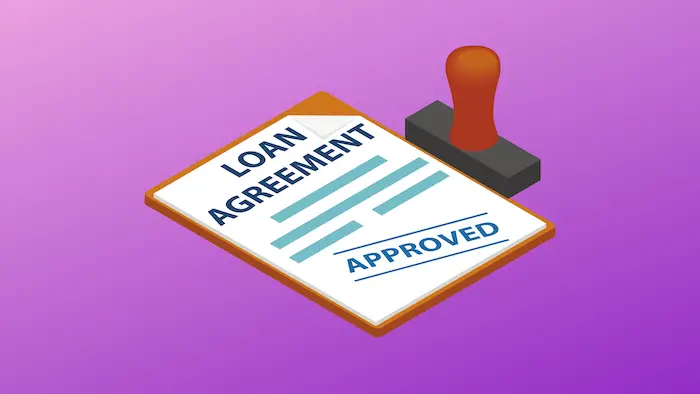
Depending on where you get your loan from, you can expect to receive your funding as fast as a few days after the approval of your loan. Make sure to ask and follow up with your bank or private lender contact to know exactly when you will get your funds.
Tips & Warnings
1. Make sure you are taking a loan from a legitimate and trustworthy lender
To guarantee their legitimacy, make sure that the lender has a secondary registration (a Certificate of Authority) from the Securities and Exchange Commission (SEC). This registration is different from the regular primary registration that every registered corporation has. The SEC website has a partial list of lending companies with CA’s. To be absolutely sure, it is best to check the status of the private lender with the SEC.
2. Separate your business and personal finances
It’s easy for a business owner to blur the lines between personal and business spending. Keeping them separate is one approach to ensure long-term success and financial progress. Use suitable accounting and bookkeeping procedures to treat financials independently.
3. Avoid default penalties
Now comes arguably the hardest part: ensuring that you can pay back your loan. Missing out on your payments for your loan can have very dire effects. Late payments are subject to heavy penalties of 18% or higher depending on what’s specified in your loan agreement. For secured payments, failing to pay for your loan could lead to the forfeit of your secured asset, which could be the very house you are living in.
Here are a few tips to keep ahead of your loan payments.
- Plan ahead. If you opted to go for a term loan, you should already know exactly how much and when you will need to pay back the amortization of your loan. Because of its predictability, it would be wise to set aside a part of your budget to pay for your loan. Remember, having a good credit history will in turn improve your relationship with your bank for future business transactions with them.
- Monitor your cash flow. If you decided to go for a credit line loan, make sure that you diligently keep track of all of your cash flows, including those made using your credit line. This goes a long way in effectively monitoring your business’ financial health.
- Take advantage of peak seasons. Make an effort to pay back more of your loan during peaks and surges. This will ease the burden of having to pay loans during slower seasons. Some lenders will even give you discounts if you can pay in advance or in excess of your monthly dues. It would be best to ask your lender to take advantage of these kinds of discounts.
Related: How To Get a Government Loan for Small Businesses in the Philippines
Frequently Asked Questions
1. What happens if you don’t pay back a business loan?
Generally, the loan agreement itself will list the penalties for failing to pay back a business loan. The most common consequences for failure to pay are termination of the loan, acceleration of the entire amount demandable (i.e., the entire loan obligation becomes immediately due and demandable), imposition of penalties on top of the principal and interest already due, and foreclosure of the collateral.
2. Can you go to jail for not paying a bank loan?
No, no one can be criminally prosecuted for failure to pay a debt. However, if you have issued checks for payment and these checks are dishonored, you may be criminally liable for a violation of Batas Pambansa Blg. 221.
3. What to do if your loan application is rejected?
Usually, loan applications are rejected because you haven’t submitted or fulfilled all the requirements. Try to talk to your banker and lender to see how you can meet the missing requirements and get your loan application approved.
4. I don’t have a credit history. Can I apply for a loan?
This depends entirely on the discretion of the bank or lender. If you have suitable collateral or a good business, this may convince a bank or lender to extend a loan to you even without a credit history.
References
- Official Gazette of the Republic of the Philippines. Batas Pambansa Blg. 22 (An Act Penalizing the Making or Drawing and Issuance of a Check Without Sufficient Funds or Credit and for Other Purposes) (1979).
Rod Michael Perez
Rod Michael Perez is a freelance writer with over 7 years of experience in writing long-form articles, ad copy, and SEO content for local and foreign clients. He is also an aspiring startup founder and believes that the Philippines could be the next hub for startup culture. He takes care of his dog, a poodle-Shih Tzu hybrid, in his spare time.
Copyright Notice
All materials contained on this site are protected by the Republic of the Philippines copyright law and may not be reproduced, distributed, transmitted, displayed, published, or broadcast without the prior written permission of filipiknow.net or in the case of third party materials, the owner of that content. You may not alter or remove any trademark, copyright, or other notice from copies of the content. Be warned that we have already reported and helped terminate several websites and YouTube channels for blatantly stealing our content. If you wish to use filipiknow.net content for commercial purposes, such as for content syndication, etc., please contact us at legal(at)filipiknow(dot)net